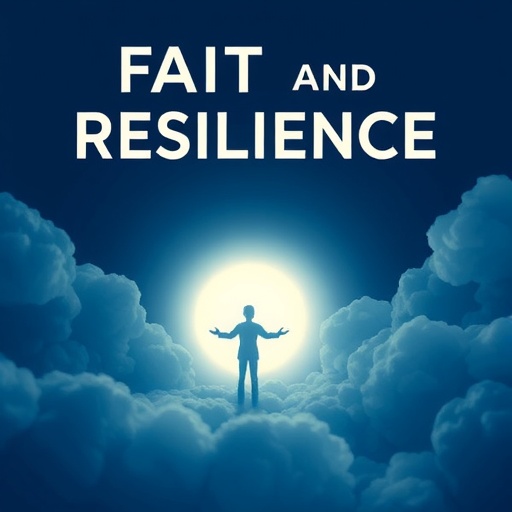In an increasingly complex and fast-paced world, the relationship between religion and mental resilience has come into sharp focus. A recent study published in the journal Pastoral Psychology by Roszak, Horvat, and Oviedo et al. explores this intricate connection and proposes innovative strategies aimed at enhancing cognitive resilience through spiritual frameworks. This groundbreaking work delves into how religious beliefs and practices can act as significant buffers against the cognitive attacks that individuals face in their daily lives.
The authors argue that cognitive attacks encompass various stressors such as anxiety, information overload, and challenging life situations that can undermine mental well-being. As societies become more interconnected, these cognitive stressors manifest in different forms—from misinformation on social media to the relentless pace of daily life. Recognizing these threats is imperative, but equally essential is understanding how to counter them. This study outlines a multifaceted approach that intertwines religious principles with psychological resilience-building strategies.
At the heart of the research is the idea that religious beliefs can serve as a powerful anchor during turbulent times. For many, faith provides not just comfort but also a framework for understanding complex life events. The study highlights how rituals, community support, and a sense of belonging foster resilience. These elements are particularly crucial in times of crisis, as they can help individuals navigate emotional turmoil and regain control over their cognitive landscape.
The authors conducted a rigorous analysis, combining qualitative interviews with quantitative metrics to explore how various religious practices influence resilience. Participants in the study reported that prayer, meditation, and community gatherings not only offered emotional support but also facilitated cognitive clarity. Engaging in these practices allowed individuals to process their experiences while simultaneously reinforcing their spiritual beliefs, creating a powerful cycle of resilience.
One particularly striking finding is that the communal aspect of religious practices plays a crucial role in resilience-building. The authors argue that shared experiences within religious communities create a sense of solidarity that diminishes feelings of isolation. In crises, having a supportive network can significantly enhance an individual’s ability to cope with cognitive stressors. The feeling of being part of something greater than oneself has profound implications for mental health, offering not just emotional solace but practical strategies for coping.
Moreover, the study sheds light on the psychological mechanisms through which religion enhances cognitive resilience. It posits that religious narratives often come with inherent frameworks for understanding adversity. By framing personal challenges within a larger spiritual narrative, individuals can recontextualize their struggles, fostering hope and providing a renewed sense of purpose. This reframing is a key cognitive strategy in resilience psychology, promoting adaptive responses to stress.
The implications of this research extend beyond individual resilience. As social isolation becomes a pressing concern in contemporary society, fostering religious communities may serve as a vital public health strategy. The authors advocate for integrating spiritual practices into mental health programs, suggesting that counselors and therapists could benefit from including spiritual dimensions in their resilience-building approaches. This holistic model underscores the potential for interdisciplinary collaboration between psychologists and religious organizations.
Furthermore, the authors emphasize the importance of understanding the diverse ways in which different religions contribute to resilience. While certain elements may resonate universally, specific rituals and practices can vary widely. This cultural distinction calls for tailored approaches in mental health interventions, ensuring that strategies align with the spiritual backgrounds of individuals. A one-size-fits-all model is unlikely to be effective; rather, a nuanced understanding of religion’s role in resilience is required.
As the world grapples with the challenges posed by modernity, the integration of faith into resilience-building strategies offers potential breakthroughs. The researchers offer actionable insights for individuals, communities, and mental health professionals alike. From promoting regular participation in communal prayer to encouraging personal meditation practices, the findings advocate for a proactive approach to cultivating resilience.
In conclusion, the study by Roszak and colleagues serves as a timely reminder of the power of faith and community in fostering resilience. It invites readers to reconsider how they engage with their spiritual beliefs, suggesting that in an era dominated by cognitive attacks, turning to religion might not just be a source of solace but also a vital strategy for mental fortitude. The intersection of religion and psychology is rich with potential, and this research opens the door to new conversations about building resilience in the face of adversity.
Rigorous inquiry into these themes is essential in shifting societal narratives around mental health. The authors’ work encourages further exploration into how spiritual beliefs function not only as coping mechanisms but also as pathways to enhanced psychological wellness. By illuminating the mechanisms through which religion fosters resilience, this study lays a foundation for future research aimed at developing integrated care models that honor both the psychological and spiritual dimensions of human experience.
As we absorb these insights, we are prompted to reflect on our own beliefs and how they can be harnessed to navigate our increasingly complex lives. Whether through organized religion or personal spirituality, the quest for resilience may very well be deeply intertwined with our spiritual pursuits. Indeed, the strategies outlined in this research hold promise for all who seek to fortify their mental fortitude in an ever-changing world.
Subject of Research: The interplay between religion and cognitive resilience in response to stressors.
Article Title: Religion and Growth in Resilience: Strategies to Counter Cognitive Attacks
Article References:
Roszak, P., Horvat, S., Oviedo, L. et al. Religion and Growth in Resilience: Strategies to Counter Cognitive Attacks.
Pastoral Psychol (2025). https://doi.org/10.1007/s11089-025-01231-5
Image Credits: AI Generated
DOI: 10.1007/s11089-025-01231-5
Keywords: Religion, resilience, cognitive attacks, mental health, spiritual practices, community support.




